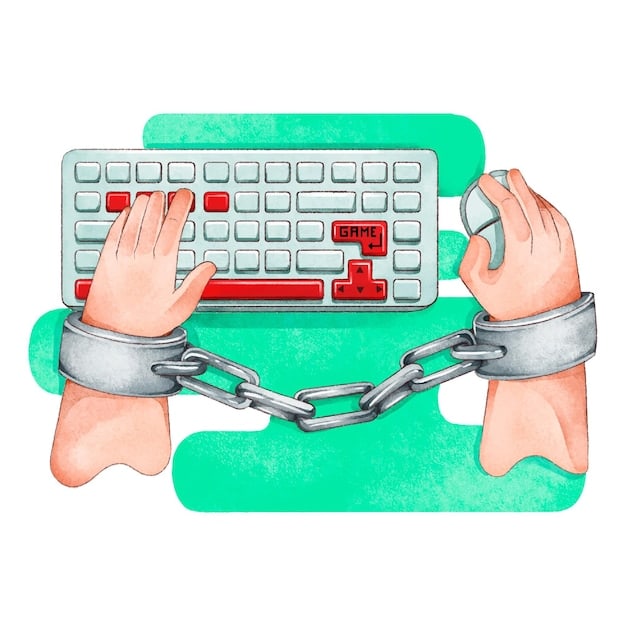US Cybersecurity: Lawmakers Push for Stricter Penalties on Cybercrimes

US lawmakers are advocating for enhanced penalties for cybersecurity crimes to deter malicious activities and protect critical infrastructure and sensitive data, aiming to modernize legal frameworks to address evolving cyber threats.
US lawmakers are intensifying efforts to combat cybercrime by proposing stricter penalties for offenses that threaten national security and personal data. Understanding these proposed changes is crucial for individuals and organizations alike, as the digital landscape becomes increasingly vulnerable to sophisticated cyberattacks. This article dives into what you need to know about the US lawmakers propose stricter penalties for cybersecurity crimes and its potential impact.
The Growing Threat of Cybersecurity Crimes
Cybersecurity threats are not a distant concern; they are a present and growing danger affecting individuals, businesses, and governments alike. From ransomware attacks to data breaches, cybercrimes pose significant financial and operational risks. Understanding the scale and scope of these threats is the first step in appreciating the need for enhanced legal measures.
Types of Cybersecurity Crimes
Cybersecurity crimes are diverse, ranging from simple phishing scams to sophisticated attacks targeting critical infrastructure. Some common types include:
- Ransomware Attacks: Blocking access to data or systems until a ransom is paid.
- Data Breaches: Unauthorized access and theft of sensitive information.
- Phishing: Deceptive attempts to obtain personal data through fraudulent emails or websites.
- Malware Infections: Introduction of malicious software to disrupt or damage computer systems.
The Impact of Cybercrime
The impact of cybercrime extends beyond financial losses. It can also lead to reputational damage, loss of customer trust, and disruptions to essential services. For instance, a successful ransomware attack on a hospital could jeopardize patient care, while a data breach at a financial institution could compromise the personal information of millions of customers.

The increasing sophistication and frequency of cyberattacks necessitate a robust legal framework that not only punishes offenders but also deters future criminal activity. US lawmakers recognize this urgency and are proposing stricter penalties to address the evolving threat landscape.
Key Proposals for Stricter Penalties
Several key proposals are under consideration to strengthen the legal consequences for cybersecurity crimes. These proposals aim to update existing laws, increase penalties for severe offenses, and provide law enforcement with the tools needed to effectively investigate and prosecute cybercriminals. Understanding these proposals is essential for grasping the potential changes on the horizon.
Enhanced Sentencing Guidelines
One of the primary proposals involves enhancing sentencing guidelines for various cybersecurity crimes. This could mean longer prison sentences, higher fines, and other punitive measures designed to reflect the severity of the offense. The goal is to ensure that cybercriminals face consequences that are proportionate to the harm they cause.
Expansion of Criminal Statutes
Another key proposal focuses on expanding criminal statutes to cover a broader range of cyber activities. This could include new laws targeting specific types of cyberattacks, such as those that disrupt critical infrastructure or involve the theft of intellectual property. By broadening the scope of criminal law, lawmakers aim to close loopholes and ensure that all forms of cybercrime are subject to prosecution.
- Mandatory Reporting Requirements: Compelling organizations to report data breaches and cyber incidents to regulatory authorities within a specified timeframe.
- Increased Funding for Law Enforcement: Allocating additional resources to support cybercrime investigations and prosecutions.
- International Cooperation: Strengthening partnerships with foreign governments to combat transnational cybercrime.
Focus on Deterrence
Ultimately, the goal of these proposals is to deter cybercrime by increasing the perceived risks and costs associated with such activities. By sending a clear message that cybercriminals will face severe consequences, lawmakers hope to discourage potential offenders and protect the digital infrastructure of the United States.
The effectiveness of these measures will depend on their implementation and enforcement, as well as ongoing adaptation to the ever-changing tactics of cybercriminals.

The Rationale Behind the Proposed Changes
The push for stricter penalties for cybersecurity crimes is driven by several factors, including the increasing sophistication of cyber threats, the growing economic impact of cybercrime, and the need to protect critical infrastructure and sensitive data. These factors underscore the urgency of modernizing legal frameworks to address the challenges posed by the digital age.
Escalating Cyber Threats
Cyber threats are becoming more sophisticated and targeted, with attackers employing advanced techniques to evade detection and compromise systems. This requires a proactive and adaptive approach to cybersecurity, including stronger legal deterrents.
Economic Impact of Cybercrime
Cybercrime inflicts significant economic damage, costing businesses and individuals billions of dollars each year. This includes direct financial losses, as well as indirect costs such as business disruptions, reputational damage, and legal expenses. Stricter penalties are seen as a way to reduce the economic burden of cybercrime.
The economic impact can be further illustrated by considering specific examples:
- Ransomware Payments: The average ransom payment has increased significantly in recent years, placing a heavy financial strain on victimized organizations.
- Data Breach Costs: The cost of a data breach includes expenses related to investigation, notification, remediation, and potential legal settlements.
- Lost Productivity: Cyberattacks can disrupt business operations, leading to lost productivity and revenue.
Protecting Critical Infrastructure
Critical infrastructure, such as energy grids, transportation systems, and financial networks, is increasingly vulnerable to cyberattacks. A successful attack on critical infrastructure could have devastating consequences, jeopardizing public safety and national security. Stricter penalties are needed to deter attacks on these vital systems.
By increasing the legal risks associated with cybercrime, lawmakers hope to create a stronger deterrent effect and protect the digital assets of the United States.
Potential Challenges and Criticisms
While the push for stricter penalties for cybersecurity crimes has broad support, it also faces potential challenges and criticisms. Some argue that harsher penalties alone are not enough to deter cybercrime and that more emphasis should be placed on prevention and education.
Effectiveness of Deterrence
Some critics question whether stricter penalties will truly deter cybercriminals, particularly those operating from outside the United States. They argue that cybercriminals are often motivated by factors other than financial gain, such as political ideology or espionage. Therefore, they might be less susceptible to deterrence based on the threat of punishment.
Balancing Security and Privacy
Another challenge involves balancing the need for enhanced cybersecurity with the protection of individual privacy rights. Some worry that stricter laws and increased surveillance could lead to abuses of power and infringements on civil liberties.
To address these concerns, lawmakers must carefully consider the following:
- Transparency and Accountability: Ensuring that surveillance activities are conducted in a transparent manner and subject to oversight.
- Protecting Privacy Rights: Implementing safeguards to prevent the misuse of personal data collected during cybercrime investigations.
- Proportionality: Ensuring that penalties are proportionate to the severity of the offense and that defendants are afforded due process.
Need for Prevention and Education
Many experts argue that prevention and education are just as important as punishment in the fight against cybercrime. This includes educating individuals and businesses about cybersecurity best practices, as well as investing in technologies and strategies to prevent cyberattacks from occurring in the first place.
By addressing these challenges and criticisms, lawmakers can develop a more comprehensive and effective approach to combating cybercrime that protects both security and privacy.
Implications for Businesses and Individuals
The proposed changes to cybersecurity laws will have significant implications for businesses and individuals alike. Businesses will need to enhance their cybersecurity measures to protect themselves from cyberattacks and comply with new reporting requirements. Individuals will need to be more vigilant about protecting their personal information online.
Increased Compliance Burdens
Businesses may face increased compliance burdens as a result of the new laws. This could include implementing new security protocols, training employees on cybersecurity best practices, and reporting data breaches to regulatory authorities. Non-compliance could result in hefty fines and other penalties.
- Regular Security Audits: Conducting periodic assessments of cybersecurity posture to identify vulnerabilities and gaps.
- Employee Training Programs: Educating employees about phishing scams, malware infections, and other cyber threats.
- Incident Response Plans: Developing plans to respond to and mitigate the impact of cyberattacks.
Enhanced Personal Responsibility
Individuals will also need to take greater responsibility for protecting their personal information online. This includes using strong passwords, being cautious about clicking on suspicious links, and keeping software and devices up to date. Failure to do so could increase their vulnerability to cybercrime.
Cyber Insurance Considerations
Businesses and individuals may want to consider purchasing cyber insurance to protect themselves from financial losses resulting from cyberattacks. Cyber insurance can cover expenses such as data recovery, legal fees, and business interruption losses. The availability and affordability of cyber insurance may be affected by the new laws.
By understanding and preparing for these implications, businesses and individuals can mitigate their risks and protect themselves from the growing threat of cybercrime.
The Future of Cybersecurity Legislation
The proposed changes to cybersecurity laws represent an important step forward in the fight against cybercrime, but they are unlikely to be the final word. As technology continues to evolve and cyber threats become more sophisticated, cybersecurity legislation will need to adapt and evolve as well. This includes ongoing monitoring of the threat landscape, as well as continuous improvement of legal frameworks.
Adaptive Legislation
Cybersecurity legislation must be adaptive to keep pace with the rapid evolution of technology and cyber threats. This requires ongoing monitoring of the threat landscape, as well as continuous improvement of legal frameworks.
Collaboration and Information Sharing
Effective cybersecurity requires collaboration and information sharing between government, law enforcement, businesses, and individuals. This includes sharing threat intelligence, coordinating incident response efforts, and educating the public about cybersecurity risks.
- Public-Private Partnerships: Encouraging collaboration between government and private sector organizations to address cybersecurity challenges.
- Information Sharing Platforms: Establishing platforms for sharing threat intelligence and best practices.
- International Cooperation: Strengthening partnerships with foreign governments to combat transnational cybercrime.
Continuous Improvement
Cybersecurity legislation should be subject to continuous improvement based on experience and feedback. This includes evaluating the effectiveness of existing laws, identifying gaps and weaknesses, and developing new laws and regulations as needed.
By embracing these principles, lawmakers can ensure that cybersecurity legislation remains effective in the face of evolving threats and challenges.
| Key Point | Brief Description |
|---|---|
| 🚨 Stricter Penalties | Increased prison time and higher fines for cybercrimes. |
| 🛡️ Expanded Laws | New laws covering more cyber activities, including infrastructure attacks. |
| 📊 Compliance | Businesses must enhance security and report breaches. |
| 📚 Education | Emphasis on prevention and educating about cyber threats. |
FAQ
▼
Stricter penalties are proposed to deter cybercriminals, protect critical infrastructure, and reduce the economic impact of cybercrime, responding to increasingly sophisticated threats.
▼
Increased penalties may apply to ransomware attacks, data breaches, phishing scams, malware infections, and attacks on critical infrastructure, reflecting the severity of these offenses.
▼
Businesses will face increased compliance burdens, including enhanced security measures, employee training, and mandatory data breach reporting, to mitigate risks and avoid penalties.
▼
Individuals should use strong passwords, exercise caution with suspicious links, keep devices updated, and stay informed about common cyber threats to safeguard their personal information.
▼
The new laws could enhance international cooperation by facilitating information sharing and coordinated law enforcement actions to combat cybercriminals operating across borders.
Conclusion
The move by US lawmakers to propose stricter penalties for cybersecurity crimes underscores the growing importance of protecting digital assets and critical infrastructure. As cyber threats continue to evolve, it is essential for businesses, individuals, and governments to work together to strengthen cybersecurity defenses and deter malicious activity.





